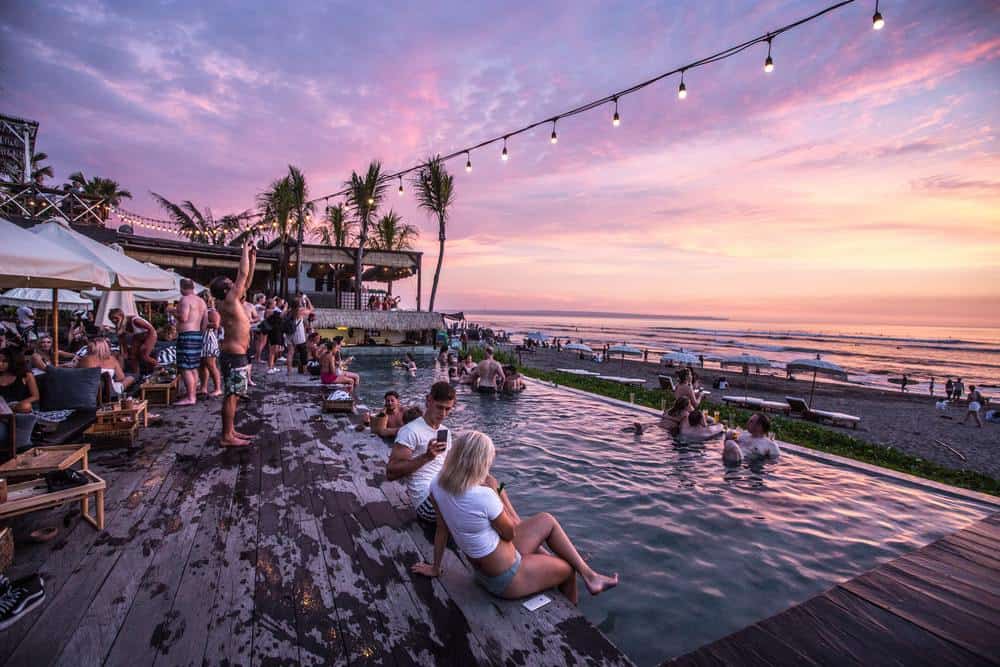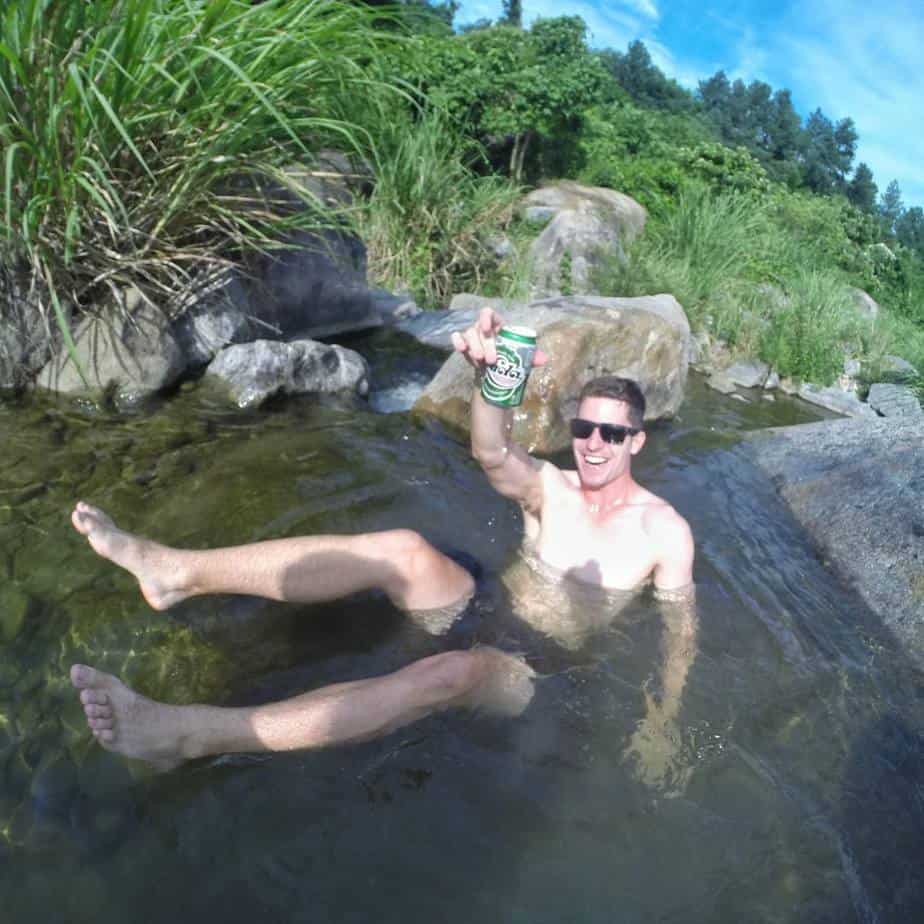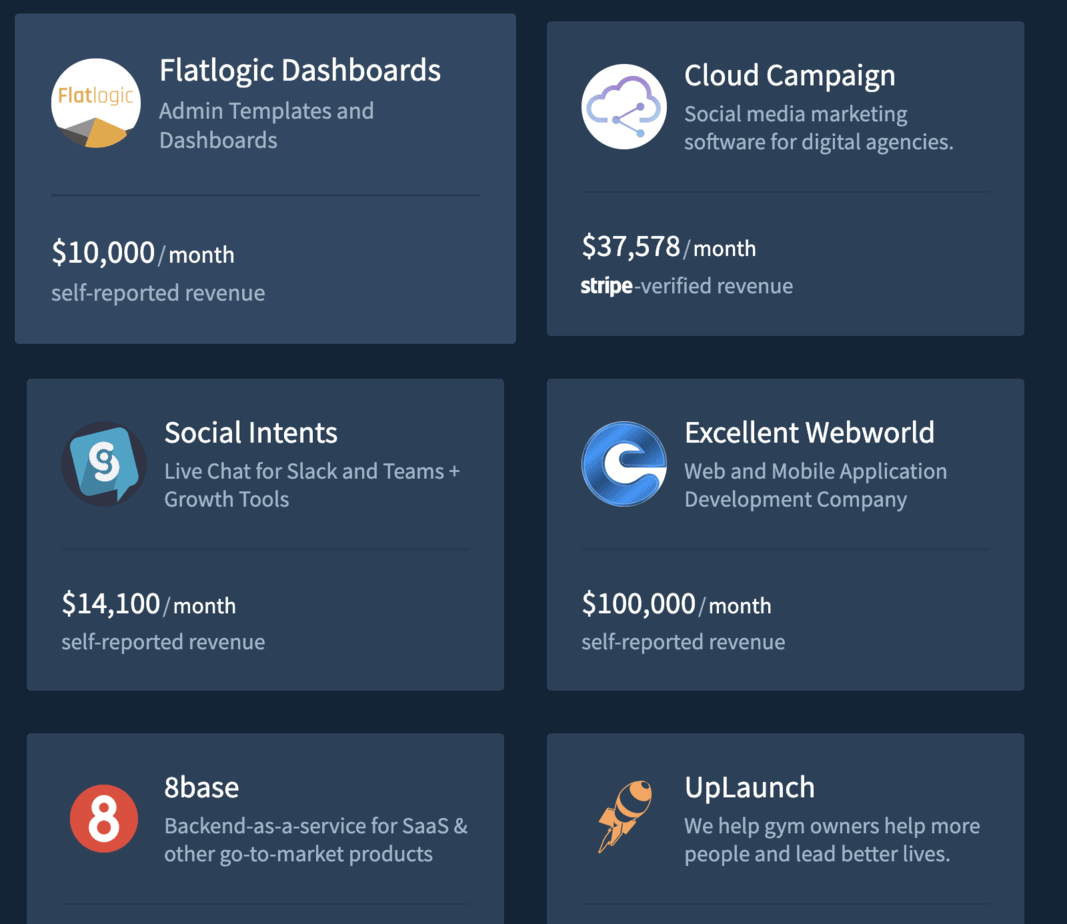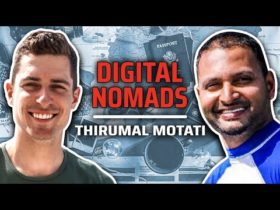Note: This post may contain affiliate links which means if you click on a link and purchase an item, we will receive an affiliate commission at no extra cost to you.
This is the latest interview in a series featuring digital nomads talking about their lives and lessons (click here if you want to be interviewed). The goal is to help demystify the process of making money online, wandering the world, and living an unconventional life!
Csaba Fenyes is a full-time digital nomad working as a translator. But his story is a bit unique in that he became a digital nomad after a full career as a teacher. Today, he’s traveling the world with an emphasis on making meaningful connections with locals and their communities.
We love Csaba’s attitude on life and his nomading style.
Take it away, Csaba!
Table of Contents
Introduce yourself! 🙂 Who are you? What do you do for work? And what is your nomadic story?
I am a good example of the non-conventional digital nomad:
- I am an over-fifty traveler, which is commonly (though, I can assure you, not always reasonably or justifiably) regarded as a “mature” traveler.
- I am from Eastern Europe, which is the most disadvantaged part of the so-called developed world, and I work for salaries common there. Yes, it’s a challenge.
- I am Gypsy (sometimes referred to as Romani), so I may be looked down on even in Eastern Europe, which is in turn very often looked down on by Western Europeans – oh yes, everyone needs someone to despise. Gypsy communities, for example, very often despise gays.
- I am gay, and my favorite countries include some where, at least theoretically, you may be punished for gay sex or even for being gay.
- I am an atheist, who loves travelling in deeply religious countries.
To make it more exciting, I would love to be black, Jewish and female too – but I am not, and anyway, in that case, some of you might say: there’s too much of a good thing.
I have a name that most people will find impossible to pronounce, but I think it is only the writing that causes confusion: Csaba is pronounced like cha-bah – I know!, but I’ve already got used to the jokes about Jabba from Star Wars. Csaba is a Hungarian name, and it originally meant something like wanderer – and indeed, that’s what I am!

Please tell us your detailed story of how you got into your line of work and how you turned it into a remote career.
I worked as a teacher for most of my life before I realized that I wanted to do something different. I was actually forced to find something new because private teaching didn’t pay enough any more. I was lucky to find a translating company that gave me enough work in a field that I was good at and which I enjoyed (IT, cloud technology, AI etc.). But the best thing about it was that you didn’t need to meet anyone in person at all to do the job.
This was the time when I decided to become a “full-time” digital nomad. I had already traveled extensively before that, so being on the road was definitely not a new thing for me, and I enjoyed it a lot. Four years ago, I bought a plane ticket to Kuala Lumpur, and that was that. I returned to my home country (Hungary) for short visits a few times since then, the last of which was necessary because of the pandemic – and this one seems to be much longer, unfortunately. But I hope I will be able to “escape” from my home country very soon, and continue my wonderful journey around the world.
What does a day in your work life look like? Paint a picture for us :).
I work too much, unfortunately, but I wouldn’t be able to finance all my needs otherwise. Whatever time zone I am in, I need to be online at about 10 a.m. EU time, because I receive my daily dose of jobs every morning. Some of these jobs have a deadline for the same day, actually within a few hours. So if 10 a.m. Europe time means 5 p.m. where I am. It’s not too comfortable, to say the least.
When I choose accommodation, one of the most important questions to consider is whether it has reliable Wi-Fi. My job requires continuous internet connection – the moment I get offline, I must stop working. That is tough, so I always have mobile data plans as a backup.
I very often work in cafés, where I usually make friends with the waiters and the staff. I always enjoy working in open-air cafés a lot. When I allow myself a little break, I can always do some people watching or chat with the waiters. I have never used co-working spaces, but maybe I will try some of them later (I think most of them charge too much).

I also work “at home,” in my rented apartment – when booking, I make sure they are comfortable – and if so, I go out to have lunch and dinner, rather than cooking for myself, because I would feel too lonely if I stayed in all day long.
I try to have free weekends, so that I can go and discover new places, meet people, or just do touristy things like visiting museums, watching a show or hiking.
Every now and then, I make myself free from work for a week or so, and then I can venture further out. This could be a longer journey too. In Laos, for example, I didn’t want to do any work, so I spent 10 days there, free from work, in the mountains. It was one of the most memorable experiences in my life!

What inspired you to start nomading? And how has nomading changed your perspective on life?
I came up with the idea of nomading long before the term was born, but I didn’t actually accomplish my plans back then. I was a private language teacher, and I had this wonderful idea: what if I could carry on working and making money, while I was travelling the world? So I learnt programming, and created an online distance-learning system, hoping that I would be able to do what I wanted.
I couldn’t. The only thing I didn’t take into account was that I am absolutely useless in business or anything really, that is slightly related to money. The business went so-so at the beginning, but not well enough to pay for everything, so I had to go on teaching offline besides the online courses.
But I could eventually start nomading a few years ago (more on this below).
I don’t think nomading changed my perspective on life much. I have always been open minded. I have always been interested in other cultures. I have always been fascinated by people who live differently from me – or differently from what is regarded normal by some. Indeed, I have always hated the word ”normal.”
Some people say that travelling will open up your mind and widen your perspective. Perhaps even make you wiser and more accepting towards others. I don’t know. I am not saying I don’t think so, I really don’t know. Which means that I still haven’t found evidence either for or against it.
But there’s this one thing I couldn’t help but notice during the years: most travelers that I meet seem to share a lot of the characteristic features that make me what I am: they are open-minded people, they want to explore the world, they don’t refuse something only because it is different from what they are used to, and they tend to examine conflicting opinions before they judge them. I have met a lot of digital nomads and other long-time travelers, but none of them were homophobic, none of them were racist, none of them voted for leaders in their countries that I wouldn’t vote for. Isn’t that strange?
Because at home, you can easily explain this by saying that you choose your friends like this. But these people were not my friends, I had just met them by pure chance.
So another possible explanation is that travelling and an open mind are related, but the relationship works in the opposite direction: it is the open mind itself that makes you want to travel the world. You don’t gain openness and understanding through your travels – you just develop it further. You give it some more training. You put it to the test in the real world.

What are the 2-3 favorite places where you’ve lived/traveled to and why?
That’s a tough one, because I have enjoyed and loved most of the places I have been to as a digital nomad, and I don’t want to be unfair with the ones I am not including here. Anyway, here are three of them that you may consider as your next destination. I have decided to include the ones that are not usually on top of the list on digital nomad sites, so that you can try something new. (I would also recommend Budapest. But since it is my home town, I will not include it, lest you should accuse me of being biased.)
Yogyakarta in Indonesia is a place I fell in love with after a very short time. Yes, you can find world famous sights (Prambanan and Borobudur, to name just two) and an abundance of cultural activities in Jogja (including the Javanese puppet theatre, Javanese dances and music) – but for me, what counts the most when travelling is the local people. And in Jogja, they never run out of kindness. So much so, that it made me write a blog post titled 388 thousand reasons to visit Yogyakarta.
Waiting for midnight on New Year’s Eve in Yogyakarta
Another favorite is definitely Kuching in Malaysia, which was actually the first place where I stayed for a longer time as a digital nomad. Yes, the people are nice and welcoming in Kuching too, but there are many other reasons why I loved it here. Kuching has a little more than half a million inhabitants, but it feels like a small town on the one hand, while at the same time, it offers programs and activities that you would only expect from a huge city. There are several major events like the Rain Forest World Music Festival or the Kuching Food Festival, but there’s not one single weekend without something interesting to do. Most of them are free and organized by the city. If you include the options nearby, the possibilities are truly endless: Bako National Park, Orangutan sanctuary, hiking in the rainforest, a boat trip along the river or visiting indigenous festivals in the jungle villages are only some of the unforgettable things I have tried.
Video: Dayak musicians performing in Kuching at the Waterfront Music Festival

In Vietnam, I could recommend a number of places, but to remain “off the beaten track,” I will include Da Nang in this list. It is a huge city, but you wouldn’t notice it right away. Traffic congestions are rare, and since they receive very few Western tourists, expect to be stared at every now and then. Unfortunately, the lack of international tourism also means that most local people don’t speak a word of English. So much so, that I had a hard time even ordering coffee – even though coffee in Vietnamese is cà phê, very similar to what you would say in most other languages. (I am now professional in ordering coffee and food in Vietnamese.)

The people are extremely nice, internet speed is very good, and you will find lots of options for entertainment. Prices are much lower than in the most popular Vietnamese cities, and there are numerous sights that you can visit in and around Da Nang. I spent a little over a month there, staying in what was advertised as a private room on Airbnb, but what turned out to be an entire top floor, with its own kitchen and a huge roof terrace. The family was extremely nice, and I was sorry to leave.

What advice would you give to someone who’s thinking about nomading?
Don’t rush. You’re not on holiday, but working, which means that you don’t have more time for discovering new places, meeting new people and experiencing a new culture and a new way of life than you would at home, while working a nine-to-five job (OK, you might be luckier with shorter working hours, but most people are not). I always plan to stay at least several weeks in one particular place, but it is usually a month or more, because you get a discount on Airbnb if you rent the place for at least a month.
Connect with the locals. You will learn about the local way of life much more this way than if you were doing the typical touristy things. How you connect with locals depends on what approach makes you feel most comfortable. If you are a very sociable person, you will have no problem. If less so, then try finding accommodation where you will be “forced” to meet local people. An apartment in a residential building, a small family run guest house further away from the tourist district, or even renting only a room with a local family (make sure you will have enough privacy). I have tried all this myself, and without exception, it turned out a highly enjoyable experience. This is how I made long lasting friends with a Vietnamese family. This is how I learnt a lot of “secrets” about how a Muslim family really lives in Indonesia or how they celebrate family events. I was invited to family dinners, to a school trip of the family’s little son, to a religious ceremony in a tiny village – and the list goes on.

Plan ahead, but don’t overdo it. Freedom is one of the greatest values of nomading. If you plan every single day of your stay ahead, you will lose some (most?) of this freedom. Say you have planned to stay in Colombo for a month, you have paid for accommodation, and you also have your flight tickets there and away. What happens, if after a few days only, you find out that you don’t like the place at all? You either lose a lot of money, or you are forced to stay somewhere that you don’t like. Colombo is a real life example in my case, I decided to escape after exactly one week – but I didn’t lose any money, because I didn’t plan my stay very much.
On the other hand, there are times when you will want to prepare. Do you want to visit a famous festival in one of the cities? Make sure you pre-book accommodation and flights. Are you going somewhere extremely popular? The best guesthouses and Airbnb places will have been booked weeks (sometimes even months) ahead.
For me, weather is also highly important. So I planned my stay in Hanoi so that my three months of visa period would end just before the cold weather arrives.
And last but not least, a warning. There seems to be a misconception that being a digital nomad will open up new ways of earning (easy) money. This is unfortunately reinforced by a large number of videos posted by digital nomads online. My advice is this: ask yourself the question why you would be more successful in starting an online business while travelling the world as opposed to starting it while sitting at home. Nomading is not a way to start earning money – it is a way to do your job while you are travelling. Do you have a job already that you can do online? If so, you can start your journey. If not, find one before you buy a plane ticket to Chiang Mai or Bali.
If you’re a woman, person of color, and/or LGBTQ, what should other people who identify similarly (and who haven’t traveled much) know about traveling/nomading?
I am gay, and when I am at home, I like to visit various gay places – clubs and pubs and other venues. Although there are a few cities in Southeast Asia where they do have gay clubs, I only had the courage to visit some of them in Bangkok and Bali. It was fun, but I was sure that I wouldn’t be prosecuted if “caught,” because being caught itself was meaningless. These clubs were very open, with loud music and open terraces for everyone to see and join.
Kuala Lumpur supposedly has some gay-ish venues, but I didn’t think it was a good idea to visit any of them. Malaysia has laws against gay sex (not against simply “being gay”), and although they have only used it against one particular politician of the opposition (three times!), you never know. I might be a worry wart on this, but you must understand that Malaysia is “officially” a Muslim country. With that said, I was really surprised when a Malaysian man, himself a tourist, whom I shared an apartment with for a week or so in Borneo, said to me during our very first conversation that he was gay, and that his partner had passed away. Now whether this was some kind of encouragement for me or not, I will never know, because we never went further than this.
In Indonesia, somewhere in a non-touristy small town, I was again approached by a local guy, obviously gay, who even gave me his telephone number before we said goodbye to each other. But again, I was so nervous that I never called that number. Indonesia has just expelled a Western digital nomad, who was raving about Bali as an LGBT-friendly place.
I honestly don’t know what advice I should give. For me, it is better to be safe than sorry. Should you meet the love of your life in this part of the world, I think you will definitely find a solution for how to carry on. On the other hand, if you only want adventures and fun, I think you should think twice before you act. Blackmailing is not unheard of either, and if you get in trouble, who knows where this might lead.

For someone interested in getting into your field of work, what’s the best advice that you would give? And what books, podcasts, thought leaders or other learning resources do you recommend?
There is a lot of competition in translation, so my best advice is to find a niche that you think you will be able to succeed in. Online presence is very important. Find all the most popular translation portals, register and keep track of what is happening. Most of them will have job offers, too, but watch out for scam offers – there are too many of them out there! Learning to use CAT tools is essential.
What digital tools do you use for your work?
As a translator, I need to use the software that the client wants me to. My biggest client now uses the webapp version of a translation and management software, which means “no internet – no work done.”
In writing, I communicate with the project manager through Skype, but we also use WhatsApp, if we want to chat rather than exchange quick messages. I also need special apps on my phone for logging in to my work system (two-factor authentication).
I also need some not strictly work related apps. Google Maps is essential (as is the compass in my phone – I once had to send back my new phone because it turned out that it didn’t have a compass), and of course I need my banking apps. OneNote is also essential (it could be any other note taking tool though), and when I am in Southeast Asia, I just can’t live without Grab. A good calendar app with automatic and instant syncing with all my devices is also important (Business Calendar), as well as a mail app that notifies me with different sounds depending on the account (I use BlueMail). I also have some travel related apps like Airbnb and Skyscanner, but they are not essential, since you can easily use their web versions, too.
And of course, cloud storage is a must. Don’t even think about doing anything without one. I use Microsoft’s OneDrive, which is not worse than others, but certainly cheaper, because you get it “free” with 1 TB storage if you pay for their Office suite, not to mention the 60 minutes of free Skype calls every month, which has already saved me a lot of trouble (and/or money).
If you only had a few minutes to live, what are the most important life lessons that you would share with the world?
Connecting with people and maintaining already existing relationships and friendships is much more important than I thought before. Also, approach everything and everyone with an open mind. You never know what you can learn from even the most simple looking chap that you accidentally meet somewhere. At the same time, always use a healthy dose of doubt/suspicion. If something feels fishy, don’t take the risk, especially if you have a lot to lose. The hardest thing is of course finding the right balance between the two.
But then, life would be terribly boring if there was a recipe for everything.

How can people learn more about you and your work?
I have a blog where I share some of my experiences and where I try to give tips and advice for future (and current) digital nomads and travel enthusiasts: https://www.digitalnomadupdates.com/
I also have my Instagram, which I am planning to update more often: https://www.instagram.com/digital_nomad_updates/
Pinterest: https://pinterest.com/digital_nomad_updates/









Leave a Reply
View Comments